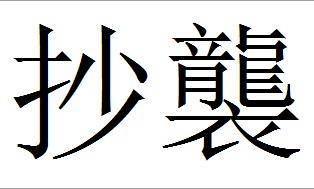 China’s economy is rapidly growing in a variety of industries. One growing sector is even profiting off of the rising incidence of plagiarism in China’s university and research institutions.
China’s economy is rapidly growing in a variety of industries. One growing sector is even profiting off of the rising incidence of plagiarism in China’s university and research institutions.
It’s boom time for sites like ‘Gunner’s Alliance’ and individual freelancers who profiteer by writing PhD dissertations and Master’s thesis papers for Chinese students willing to pay a hefty fee.
The Epoch Times recently composed a very interesting series of articles on cheating and plagiarism in China entitled “Fraud Goes to School in China.“ The articles particularly focus on China’s universities and the presence of plagiarism within all aspects of higher education and science publishing.
From the Epoch Times:
‘China has become the top producer of masters and doctorates in recent years, but academic cheating has been on the rise at the same time. ‘There are two kinds of cheaters, those who are not interested in academics but only in money, and those who do not have the capacity to produce,” Jiawen said. “Students find their peers plagiarizing without being punished, so they do the same.”‘
Using the CrossRef database and iThenticate’s plagiarism software, Nature Publishing Group cited one Chinese science journal, the Journal of Zhejiang University–Science A&B, to have a 31% incidence of plagiarism in all papers published since 2008. This journal is considered an integral part of the country’s scientific research efforts.
These cases of plagiarism aren’t necessarily confined within China though. Outbreaks of plagiarized papers have made their way from China into foreign science journals, including those in the UK and US. The UK Science Journal Acta Crystallographica Section E needed to retract 70 articles earlier this year, all of them stemming from groups out of China.
There may be several reasons for a particularly high incidence of plagiarism in the Chinese university and research system.
One cause could be a high pressure environment for grad students and researchers to regularly publish in high-prestige journals.
Kara Mosher, the managing editor of the Journal of Cancer Biology and Therapy, explains her take on a large quantity of plagiarized submissions coming out of China:
“We publish papers from sources all over the world. In China, there is a lot of pressure for scientists to publish (in grad school) with journals of a certain impact factor. Also, I tend to think the language barrier leads to plagiarism, as most cases include basic textual wording stolen from other papers even though the Chinese papers have unique data results.”
Yet another reason for plagiarism could be the minimized risk of punishment in China compared to the possible repercussions in the US or Europe. The Epoch Times articles note that ‘Chinese law has been either nonexistent or lenient on plagiarism’.
Just as is true in the US, Chinese businesses and universities will soon find that plagiarism comes with a price. If it goes unchecked, plagiarism can discredit major institutions, and in this case, even a whole country. If China’s growing force of researchers is to be taken seriously, there needs to be a system in place to prevent plagiarism from occurring before it gets out the door.
Early education about what plagiarism is and why it is wrong is the first step to prevent future cases.
The second step has already begun; the implementation of plagiarism scanning technology at checkpoints throughout both the education and research publication processes.
The final step is increased repercussions for plagiarism; the Chinese government and its associated institutions need to acknowledge the problem and take steps in the right direction to dissuade plagiarism.
Citations
Wang, Si. “Fraud Goes to School in China, Part 1 of 3“ The Epoch Times. 6 October 2010. http://www.theepochtimes.com/n2/content/view/43786/
Wang, Si. “Fraud Goes to School in China, Part 2 of 3“ The Epoch Times. 12 October 2010. http://www.theepochtimes.com/n2/content/view/44143/
Zhang, Yuehong. “Chinese journal finds 31% of submissions plagiarized” Nature Publishing Group. 9 September 2010. http://www.nature.com/nature/journal/v467/n7312/full/467153d.html
“Testimonial: Landes Bioscience” iParadigms, LLC. http://www.ithenticate.com
Related
Topics: Current Events,International